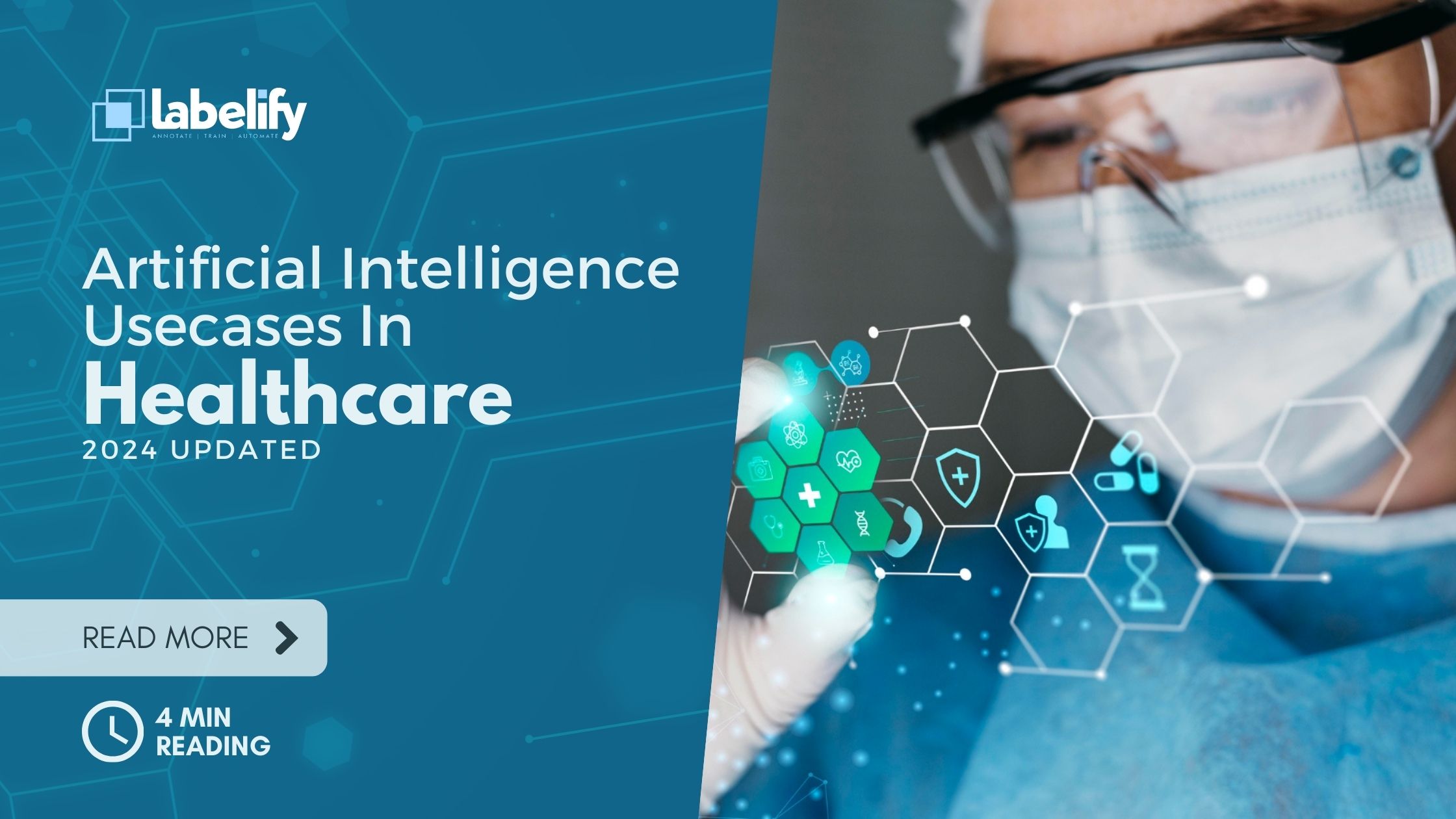Artificial Intelligence Usecases in Healthcare this article, we’ll explore how AI is transforming healthcare with its remarkable impact.
AI has revolutionized the way we diagnose, treat, and monitor diseases, saving lives and improving patient outcomes.
From radiology and breast cancer detection to drug discovery and remote patient monitoring, Artificial Intelligence Usecases in Healthcare is reshaping healthcare.
AI’s ability to analyze complex medical scans, enhance diagnoses, automate administrative tasks, and even revolutionize mental health treatment has liberated healthcare through the power of AI.
Key Takeaways
AI has had a remarkable impact on revolutionizing healthcare across different medical disciplines. It has transformed radiology, breast cancer detection, pathology, administrative tasks, drug discovery, remote patient monitoring, and mental health diagnosis and treatment. AI has the potential to save lives, improve accuracy, and enhance healthcare delivery. By leveraging AI technology, we are paving the way for a future where patient outcomes improve, diagnoses become more accurate, and access to healthcare improves for all.
AI in Radiology Artificial Intelligence Usecases in Healthcare
AI has had a remarkable impact on radiology within our healthcare system. It’s improving accuracy and reducing the workload for healthcare professionals. AI technologies can extract over 1,500 data points from CT, MRI, and PET scans, leading to more precise diagnoses.
These AI systems can also analyze radiology images to detect early signs of pneumonia, saving doctors 30%-40% of detection time. Deep learning algorithms further enhance the resolution of MRI brain scans, aiding in the identification of complex pathologies.
AI is even revolutionizing breast cancer screening by guiding radiologists, enabling faster evaluations and reducing workload by 88%. In digital pathology and remote patient monitoring, AI enhances diagnostics and enables virtualization, allowing for in-depth analysis and personalized healthcare recommendations.
With AI’s transformative power, we can free healthcare providers from heavy workloads while improving patient care.
AI-Assisted Breast Cancer Detection
Moving forward from our exploration of AI in radiology, let’s now delve into the life-saving application of AI-assisted breast cancer detection. AI has made significant strides in the field of radiology, particularly in breast cancer screening. Regular screenings are crucial for improving survival rates, and AI solutions play a vital role in guiding radiologists and helping them evaluate cases up to 15-20% faster. These AI algorithms for mammography readings have been proven to be as accurate as readings performed by two doctors, reducing the workload by 88%. Given the global shortage of radiologists, AI systems can relieve the pressure on healthcare systems and facilitate the expansion of breast screening and cancer detection programs.
| Advancements in Radiology AI for Breast Cancer Detection | Benefits of AI-Assisted Breast Cancer Detection |
|---|---|
| AI algorithms enhance evaluation accuracy and speed | Faster and more accurate diagnosis |
| AI reduces the workload for radiologists | Increased efficiency and productivity |
| AI solutions facilitate scaling of breast screening programs | Improved access to breast cancer detection |
| AI aids in early detection of breast cancer | Higher chances of successful treatment |
Artificial Intelligence Usecases in Healthcare for Digital Pathology
Now, let’s explore the fascinating field of Artificial Intelligence (AI) for Digital Pathology, where AI algorithms assist pathologists in analyzing, interpreting, and meticulously examining sample tissues with remarkable accuracy. In this groundbreaking field, AI is revolutionizing disease diagnosis and understanding.
Here are four crucial aspects of AI in digital pathology:
- AI algorithms for image analysis: These advanced algorithms can precisely analyze digital pathology images, enabling faster and more accurate diagnoses.
- AI-assisted diagnosis of rare diseases: AI algorithms, with their capacity to analyze vast amounts of data, can aid in identifying rare diseases that may pose challenges for human pathologists. This leads to earlier intervention and improved outcomes.
- Enhanced detection of complex pathologies: AI algorithms enhance the resolution of digital pathology images, facilitating the identification of complex pathologies. This provides pathologists with more detailed information for diagnosis and treatment planning.
- Improved clinical decision-making: By assisting pathologists in image analysis and interpretation, AI algorithms enhance clinical decision-making, resulting in more accurate diagnoses and better patient outcomes.
With the power of Artificial Intelligence Usecases in Healthcare in digital pathology, we can unlock new possibilities for diagnosing and treating diseases, particularly rare and complex conditions. The potential of AI allows us to transcend the limitations of traditional pathology methods.
Automation of Administrative Tasks in Healthcare
Continuing our exploration of AI in healthcare, let’s dive into the automation of administrative tasks, revolutionizing the way healthcare providers manage operations and improve patient care.
AI in healthcare financial management is streamlining billing processes, reducing errors, and maximizing revenue. By automating tasks such as claims management and prior authorizations, AI is saving providers an estimated $16.3 billion in operational costs.
AI in healthcare supply chain optimization is improving inventory management, reducing waste, and ensuring timely delivery of critical medical supplies.
Natural language processing (NLP) drives productivity gains by processing vast volumes of patient data, enabling efficient patient records management. With NLP, providers can access non-clinical insights from social determinants of health (SDOH) data, leading to better patient well-being and care delivery.
AI’s automation of administrative tasks liberates healthcare providers from cumbersome paperwork, allowing them to focus on delivering exceptional patient care.
Artificial Intelligence Usecases in Healthcare in Drug Discovery and Development
In our exploration of AI in healthcare, let’s now focus on the crucial role of AI in drug discovery and development. Here are four key ways AI is revolutionizing this field:
- Speeding up Drug Discovery: AI analyzes vast amounts of data to identify potential drug candidates, accelerating the discovery process and saving valuable time and resources.
- Predicting Drug Efficacy and Safety: Machine learning algorithms can predict the effectiveness and safety of drug compounds, reducing the need for extensive testing and ensuring safer treatments for patients.
- Optimizing Personalized Treatment: AI optimizes drug dosage and customizes treatment plans based on individual patient characteristics, leading to more effective and tailored healthcare.
- Improving Drug Safety: AI algorithms identify potential drug-drug interactions and adverse effects, enhancing patient safety and reducing the risk of harmful reactions.
With AI’s advancements in drug safety and its ability to streamline clinical trials, we’re witnessing a transformative shift in the way new drugs are discovered and developed. This ultimately leads to better healthcare outcomes for all.
Artificial Intelligence Usecases in Healthcare in Remote Patient Monitoring and Telemedicine
AI has uncovered numerous life-saving applications in healthcare, and one particularly impactful use is AI in remote patient monitoring and telemedicine.
AI-powered systems actively monitor patients remotely and detect early warning signs of health deterioration, allowing for timely intervention.
AI algorithms analyze data from wearable devices to provide personalized health recommendations, empowering individuals to proactively improve their well-being.
Telemedicine platforms equipped with AI capabilities facilitate remote consultations and diagnoses, bridging the geographical gap between patients and healthcare providers.
AI chatbots offer immediate responses to patient inquiries and basic medical advice, enhancing access to healthcare resources.
Artificial Intelligence Usecases in Healthcare in Mental Health Diagnosis and Treatment
As we explore the life-saving applications of AI in healthcare, one noteworthy area of impact is its use in mental health diagnosis and treatment.
- Ethical implications: AI’s use in mental health diagnosis raises important ethical questions. We must carefully address privacy concerns, data security, and potential biases in algorithms to ensure patient autonomy and protection.
- Integration with traditional therapy: AI can complement traditional therapy approaches by providing additional support and resources. Chatbots and virtual reality therapy can offer accessible and personalized mental health interventions. Integrating AI tools with human therapists can enhance treatment outcomes and improve access to care.
- Improved detection and intervention: AI algorithms can analyze speech patterns, facial expressions, and social media data to identify signs of mental health disorders and predict the risk of suicide. This early detection enables timely interventions and saves lives.
- Personalized treatment plans: Artificial Intelligence Usecases in Healthcare can assist in developing personalized treatment plans by analyzing vast amounts of patient data and identifying effective interventions for specific individuals. This tailored approach optimizes treatment outcomes and improves patient well-being.
Incorporating AI in mental health diagnosis and treatment has the potential to revolutionize the field, but we must carefully consider ethical implications and integrate it with traditional therapy for successful implementation.
Frequently Asked Questions
How Does AI in Radiology Improve the Accuracy of Diagnoses?
AI applications in radiology improve diagnostic accuracy by harnessing the power of artificial intelligence. AI technologies analyze CT, MRI, and PET scans, extracting over 1,500 data points to aid in more accurate diagnoses.
AI systems can detect early signs of pneumonia in radiology images, reducing detection time for doctors. Deep learning algorithms enhance the resolution of MRI brain scans, aiding in the identification of complex pathologies.
With AI, we can revolutionize radiology and save lives.
What Are the Benefits of Ai-Assisted Breast Cancer Detection for Radiologists?
AI-assisted breast cancer detection offers numerous benefits for radiologists.
Firstly, it improves patient outcomes by providing faster and more accurate evaluations, reducing doctors’ detection time by 15-20%.
This increased efficiency and productivity are crucial in overcoming the global shortage of radiologists.
Moreover, AI algorithms can accurately identify breast cancer on mammography readings, reducing the workload by 88%.
How Can AI Algorithms Enhance the Accuracy of Pathology Diagnosis in Digital Pathology?
AI algorithms significantly improve the accuracy of pathology diagnosis in digital pathology.
By assisting pathologists in analyzing and interpreting images, AI algorithms offer thorough examinations of tissue samples and precisely identify different pathologies.
This results in better clinical decision-making and more precise pathology diagnoses.
With advancements in AI technology, we envision a future where pathology diagnosis becomes more efficient and accurate, benefiting both patients and healthcare providers.
What Are the Cost-Saving Benefits of Automating Administrative Tasks in Healthcare Using Natural Language Processing?
Automating administrative tasks in healthcare using natural language processing (NLP) offers significant cost-saving benefits. By leveraging AI technology, providers can optimize efficiency and reduce operational costs, estimated at $16.3 billion.
NLP systems enable automating prior authorizations, claims management, and patient records, improving productivity and reducing manual workloads.
Moreover, NLP algorithms can process vast volumes of patient data, providing valuable insights for diagnosis and patient well-being.
This patient engagement and efficiency optimization can revolutionize healthcare delivery and free providers from administrative burdens.
How Does AI Accelerate the Drug Discovery Process and Improve Patient Safety in Drug Development?
AI accelerates the drug discovery process by analyzing vast amounts of data, identifying potential drug candidates, and predicting their efficacy and safety. This reduces the need for extensive testing and optimizes drug dosage based on individual patient characteristics.
AI also plays a critical role in clinical trials, identifying patient subgroups that respond better to specific treatments, enabling the development of precision medicine.
Furthermore, AI improves patient safety by identifying potential drug-drug interactions and adverse effects.
AI-powered precision medicine revolutionizes drug development and enhances patient outcomes.
Conclusion
The remarkable impact of AI in revolutionizing healthcare is evident across various medical disciplines.
AI has revolutionized radiology, breast cancer detection, pathology, administrative tasks, drug discovery, remote patient monitoring, and mental health diagnosis and treatment.
It has the potential to save lives, improve accuracy, and enhance healthcare delivery.
By leveraging AI technology, we’re paving the way for a future where patient outcomes improve, diagnoses become more accurate, and access to healthcare improves for all.




